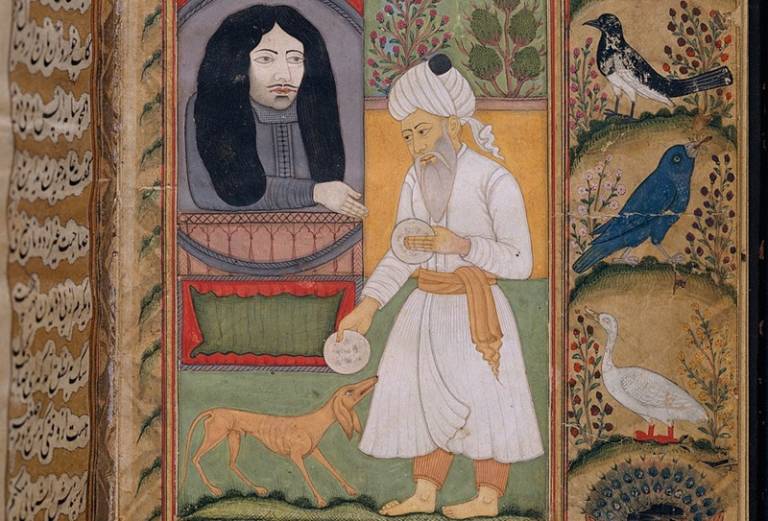‘South Asia’ + ‘Middle East’ + ‘Early Modern’ = ?
21 June 2024, 10:00 am–6:00 pm

This in-person workshop seeks to showcase new work in the field of early modern South Asian and Middle Eastern studies, while broadly examining what it means to use a period label derived from Europe’s historical experience and historiography, together with geographic categories originating in the Cold War West.
This event is free.
Event Information
Open to
- Invitation Only
Availability
- Sold out
Cost
- Free
Organiser
-
Institute of Advanced Studies
Location
-
IAS ForumG17, ground floor, South WingUCL, Gower St, LondonWC1E 6BTUnited Kingdom
For scholars of Critical Area Studies, more often working on modern topics and problems, this workshop affords an opportunity to engage with historical perspectives broadly conceived – i.e., those from history, history of art, history of science, theology, geography, anthropology, etc. How do we productively reframe Area Studies once we go deeper into the past and farther from the era that gave meaning to ‘South Asia’ and the ‘Middle East’ and manifested these categories in real-life institutions and discourse?
For scholars of South Asia and the Middle East, too, this workshop provides an opportunity to rethink categories, not least what has long been a Eurocentric one – namely, the ‘early modern’. Can we speak of a ‘global’ rather than merely a Europe-centred ‘early modernity’? Where can we locate South Asia and the Middle East in the early modern world at large, and what role(s) did these regions and their inhabitants play in shaping early modernity? And what do such findings offer, in turn, to how we understand the fields of ‘South Asian studies’ and ‘Middle East studies’?
Programme
10.30-10.45: INTRODUCTORY REMARKS
10.45-11.45: FINDING ‘EARLY MODERNITY’
Chair: Guido van Meersbergen (Warwick)
- Nandini Chatterjee (Exeter/Oxford), ‘The “lost” Mughal archives: look under the bed!’
- Pranav Prakash (Oxford), ‘Premodern Hindu Narratives + New Persian Genres of the Islamicate World + A Millennium of Literary Production = An Archive of Persian Purāṇa Manuscripts?’
11.45-12.00: BREAK
12.00-12.45: READING ‘EARLY MODERNITY’
Chair: Richard Williams (SOAS)
- Nitya Gundu (Warwick), ‘Accommodating Early Modernity: Exploring Local Narratives from the Bobbili katha’
- Avni Chag (Vrije Universiteit Amsterdam), ‘Exploring Literary Practices in Early Modern/Late Precolonial India’
12.45-14.00: LUNCH
SHOW AND TELL 1
Chair/Discussant: Nalina Gopal (UCL)
Yasmin Hayat (artist); ‘Contemporary Miniature Painting: What We've Learnt from the Mughal Masters’
14.00-14.45: CATEGORISING SPACE AND TIME
Chair: Alexander Samson (UCL)
- Zeynep Çavuşoğlu-Yıldırım (EHESS), ‘Putting things in Order & Understanding of History in Early Modern Persianate Universal Histories’
- Kristof Szitar (Lausanne), ‘Much Ado About Space: Mapping Medieval and Early Modern Dynasties’
14.45-15.30: COFFEE
SHOW AND TELL 2 & 3
Chair: Tariq Jazeel (UCL)
- Michael Talbot (Greenwich), ‘Follow the Money: The Indian Ocean Larin’
- Salila Kulshreshtha (NYU Abu Dhabi), ‘Chronologies and Geographies of the Western Indian Ocean: Mapping History Digitally’
15.30-1645: TASTING, HEARING, AND SEEING ‘EARLY MODERNITY’
Chair: Aparna Kumar (UCL)
- Peter Good (Tokyo University of Foreign Studies), ‘A Persianate Age? Contesting Early Modernity in the Indian Ocean and Middle East’
- Richard David Williams (SOAS), ‘Interpretation as Intermarriage: Musical Aesthetics between Persian and Hindavi in the seventeenth century’
- Debanjali Biswas, ‘On the Heels of Musicians: Bringing bhakti to Manipur’
16.45.18.00: CLOSING REMARKS
DRINKS RECEPTION
This workshop is being organised by the UCL Middle East Research Centre (MERC) and the UCL Centre for the Study of South Asia and the Indian Ocean World (CSSA), with generous funding from the Institute of Advanced Studies and additional support from the UCL Centre for Transnational and Global History.
 Close
Close

